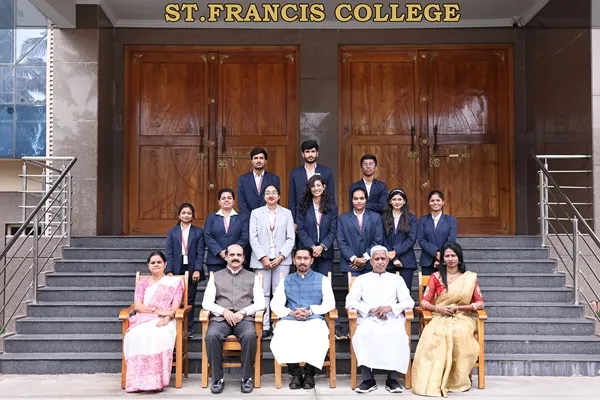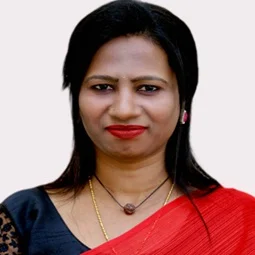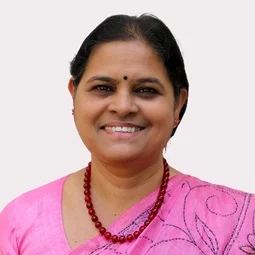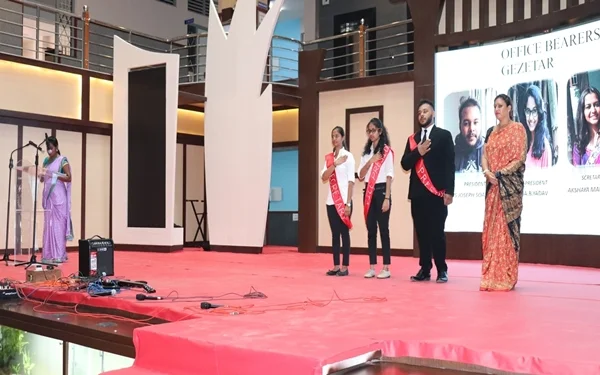
About the Department
The department of BA with triple major subjects like, Journalism, Economics and Optional English promotes standard higher education in undergraduate students. The Department drives towards the accomplishment of student desires to achieve their pre-determined goals.
The department creates positive and healthy environment in achieving life goals.
Learning English in BA program helps student to express their ideas in analytical and creative manner. It develops essay writing skills, critical methods, literary terminology and various lenses of interpretation in their writing.
“ARTHASHASHTRA” - The economics club aims to strengthen the relationship between students and professors in Dept of Economics. The club organises various activities, competitions and field trip visits to guide the students in every aspect.
The prime purpose of the club is to accomplish students’ interest and goals in an effective manner. The club offers various opportunities to learn and experience career events, seminars throughout the year.
Vision
Provide a platform to grow, develop and spread the spirit of knowledge and understanding to become living examples of successful and harmonious life.
Mission
Nurturing a learning community with values, knowledge and skills to be successful individuals.
Courses offered:
a. Economics
b. Journalism
c. Optional English
a. Bachelor of Economics.
Course summary :
Three Years Bachelor of economics inculcates critical thinking capacity, quantitative
analysis, research and communication skills in students. It also covers broad knowledge
about economic theories, principles, laws and models.
Graduates can pursue careers in various fields such as finance, government, international
organizations, and academia.
Syllabus: Link From the University Site:
SEP- ECONOMICS (1 & 2)
NEP- ECONOMICS (1 & 2)
NEP- ECONOMICS (3 & 4)
NEP- ECONOMICS (5 & 6)
NON-NEP ECONOMICS
Eligibility for admission:
A candidate who has passed two years Pre-University Examination conducted by the Pre-
University Education Board in the State of Karnataka or any other examination considered
as equivalent there to shall be eligible for admission to these programmes.
b. Bachelor of Journalism.
Course summary :
A three-year Bachelor of Journalism equips students with critical thinking, research,
storytelling, and communication skills. It covers a broad spectrum of journalism principles,
media ethics, reporting techniques, and digital media strategies.
Graduates can pursue careers in various fields such as print and digital media,
broadcasting, public relations, corporate communications, and academia.
Syllabus:
SEP - JOURNALISM ( 1 & 2 )
NEP - JOURNALISM ( 1 & 2 )
NEP - JOURNALISM ( 3 & 4)
NEP - JOURNALISM ( 5 & 6)
Eligibility for admission:
A candidate who has passed two years Pre-University Examination conducted by the Pre-
University Education Board in the State of Karnataka or any other examination considered
as equivalent thereto shall be eligible for admission to these programmes.
Programmme Outcomes
✧ PO1 : Understand human values
✧ PO2 : Responsible citizens
✧ PO3 : Knowledge of economic activities
✧ PO4 : Change in the outlook
✧ PO5 : Develop research skills
✧ PO6 : Develop communication skills
✧ PO7 : Creating an interest in literature
✧ PO8 : Develop communication skills
✧ PO9 : Keeping abreast with new technology
✧ PO10 :Problem solving skills
✧PO11 : Understand the relevance of economic policies.
Programme Specific Objective
PSO 1 : Enhancing creativity and ability in all the four skills- reading, writing , speaking and listening.
PSO 2 : Creating interest and developing skills to equip with e- media products.
PSO 3 : Understand the current economic scenario at national and international levels.
Programmme Outcomes
✧ PO1 : Understand human values
✧ PO2 : Responsible citizens
✧ PO3 : Knowledge of economic activities
✧ PO4 : Change in the outlook
✧ PO5 : Develop research skills
✧ PO6 : Develop communication skills
✧ PO7 : Creating an interest in literature
✧ PO8 : Develop communication skills
✧ PO9 : Keeping abreast with new technology
✧ PO10 :Problem solving skills
✧PO11 : Understand the relevance of economic policies.
Programme Specific Objective
PSO 1 : Enhancing creativity and ability in all the four skills- reading, writing , speaking and listening.
PSO 2 : Creating interest and developing skills to equip with e- media products.
PSO 3 : Understand the current economic scenario at national and international levels.




Infrastructure
St. Francis College, Koramangala, offers a robust infrastructure designed to support a
comprehensive educational experience. Key facilities include:
● Classrooms: Spacious and well-ventilated rooms equipped with modern teaching
aids and drawing tables.
● Library: A vast collection of books, journals, and digital resources to support
academic research.
● Laboratories: State-of-the-art labs for various disciplines, providing hands-on
learning opportunities.
● Auditorium: A large hall for hosting seminars, workshops, and cultural events.
● Sports Facilities: Amenities for both indoor and outdoor sports to promote physical
well-being.
● Cafeteria: A hygienic space offering a variety of nutritious meals and snacks.
● Wi-Fi Campus: High-speed internet connectivity throughout the campus to facilitate
digital learning.
Value Added Course
Value-added courses can significantly enhance a student’s skill set and provide
practical knowledge beyond the regular curriculum. The Department of BCA
conducts various Value added courses every semester in order to keep the
students in pace with the changing technological demands in industry.
For this purpose ,the college has made MoUs with different companies/institutes for
various courses. The courses are designed for 30-50 hours spanning the
semester(s), usually conducted on weekends apart from regular classes. These
courses are conducted by well qualified industry trainers, where-in both theoretical
and hands-on sessions are given. The students are calibrated for their
performances via tests ,thereby earning them a certificate for the same.
Duration : 30 hrs
Provider :
Certificate :
This Course covers a wide range of features in Excel that go beyond basic functions and
formulas, aiming to enhance your proficiency in data analysis, reporting, automation, and
visualization. These courses are beneficial for professionals who want to leverage Excel to its
full potential in fields such as finance, data analysis, project management, and operations. Such
as
• Advanced Formulas and Functions
• Data Analysis and Modeling
• Pivot Tables and Pivot Charts
• Power Query and Power Pivot
• Data Visualization Techniques
Duration : 30 hrs
Provider : Techbyheart
Certificate : Co branded certification Techbyheart
This course provides a foundational understanding of digital marketing. It covers
core digital marketing principles and practical skills in key areas such as social
media marketing, content marketing, email marketing, and web analytics. The
course blends theoretical learning with hands-on online projects and real-world
case studies to equip students with the knowledge and skills necessary to navigate
the digital marketing landscape.
Duration : 30 hrs
Provider:Techbyheart
Certificate:Co-branded certification Techbyheart
This course typically focuses on advanced techniques and specialized skills that go
beyond basic photo editing. These courses are designed for people who want to
deepen their understanding of Photoshop and apply it professionally in fields like
graphic design, photography, marketing, or web design.
• Advanced Photo Editing
• Creative Design Techniques
• Photo Restoration and Enhancement
• 3D and Video Editing Features
• Color Theory and Effects
Achievements
1. Daniel A and Prashanth of 3rd year BA have participated in Treasure Hunt Competition organized by MES college and secured 1st prize.
2. Shreyas from 2nd year BA bagged 2nd prize in Essay writing competition organized by KIOCL.
3. Karthik From BVA has participated in 39th All India BCU cultural competition(Skit) and secured 1st Place and also selected for nationals.
Committee and Governance
Roles and Responsibilities
Clubs
About the Club - Gazetteers Club
The Gazetteers Club is a student-driven initiative aimed at providing undergraduate journalism students with a platform to enhance their journalistic skills, collaborate on innovative media projects, and stay informed about the ever-evolving field of journalism. The club fosters an environment of creativity, critical thinking, and ethical reporting while encouraging active participation in journalistic practices both on campus and in the wider community.
Vision
To be a dynamic platform for aspiring journalists, enabling them to develop their skills, explore the power of storytelling, and contribute to the media landscape with accuracy, integrity, and creativity.
Mission
The mission of the Gazetteers Club is to:
• Provide journalism students with opportunities to engage in hands-on media experiences.
• Foster a spirit of collaboration, inquiry, and ethical reporting among budding journalists.
• Encourage critical thinking and the development of professional standards in journalism.
• Create a space for students to work on real-world journalistic projects that align with contemporary media practices.
• Empower students to share their voice through various media formats and increase their understanding of global media trends.
Objectives
• Skill Development: To provide members with opportunities to hone practical skills such as reporting, editing, photography, videography, and digital storytelling.
• Media Literacy: To promote awareness and understanding of ethical journalism practices, media law, and the impact of media on society.
• Collaboration and Innovation: To encourage teamwork among students from diverse backgrounds and expertise to produce quality journalistic content for the club’s platforms and external publications.
• Recognition and Exposure: To provide students with exposure to various media outlets, contests, and journalism awards, promoting their work and achievements.
Club Policies
Membership:
• Open to all undergraduate students pursuing a degree in journalism.
• Members must attend at least two club meetings or activities per month.
• Active participation in club projects is required to maintain membership status.
Content Creation:
• All content produced must adhere to ethical journalism standards, ensuring accuracy, fairness, and integrity.
• The club encourages diverse perspectives and voices, promoting inclusivity and non-discrimination in content creation.
Respect for Diversity:
• Members must respect diverse opinions, cultures, and backgrounds within the club and in the stories they cover.
• Discriminatory behavior, hate speech, or harassment will not be tolerated.
Confidentiality:
• Members must respect confidentiality and privacy when dealing with sources and sensitive information.
• Any internal discussions or unreleased stories should not be disclosed outside the club without prior consent.
Collaboration:
The club promotes teamwork and collaborative efforts among members. Individual projects should be balanced with group activities and contributions.
Meeting Attendance:
• Regular attendance is expected at meetings, workshops, and events.
• Absence from meetings without valid reasons or excessive absenteeism can result in a review of membership status.
Roles and Responsibilities
President:
• Oversee the overall functioning of the club.
• Organize and chair club meetings and activities.
• Represent the club to faculty, administration, and external entities.
• Ensure that the club adheres to its mission, vision, and objectives.
Vice President:
• Assist the President in managing club activities.
• Take over the President’s duties in their absence.
• Coordinate events, workshops, and special projects.
• Help maintain the club’s social media presence and communication.
Secretary:
• Maintain accurate records of club meetings, decisions, and activities.
• Handle correspondence and communications within the club.
• Manage the membership roster and ensure all members are informed about upcoming events.
Joint Secretary:
Assist the Secretary in managing and documenting meeting minutes, event planning, and administrative records.
Members:
• Actively participate in club meetings, events, and projects.
• Contribute ideas and collaborate with peers on content creation and other club activities.
• Uphold the standards of journalism ethics and professionalism.
Disciplinary Procedures
Violation of Club Policies:
• Members are expected to adhere to the club’s policies on content creation, behavior, and communication.
• A violation of any policy will be reviewed by the executive committee (President, Vice President, Secretary, and Treasurer).
Warning:
A first violation of any policy will result in a formal warning issued to the member. The warning will be documented, and the member will be given a chance to explain their actions.
Expulsion:
• In cases of severe misconduct (e.g., plagiarism, harassment, or any other form of unethical behavior) or repeated violations of club policies, the member may be expelled from the club after a thorough review.
• Expulsion can only occur following a majority vote by the executive committee and with prior communication to the member involved.
Appeals:
• Any member who feels they have been unfairly treated or disciplined has the right to appeal to the executive committee within a specified time frame.
• The committee will review the appeal and make a final decision.

About the Club - Arthashashtra Club
Arthashashtra-The Economics Club focuses on enhancing knowledge and skills, providing platform learning through organizing department level events, encouraging collaboration, professional development, Research and Innovation, leadership skills etc.
Vision:
To create a dynamic platform for students to explore, discuss, and apply economic principles in real-world scenarios, fostering analytical thinking, policy awareness, and financial literacy for personal and societal growth.
Mission:
Enhance Economic Understanding – Promote awareness of economic concepts, policies, and global financial trends through discussions, guest lectures, and workshops. Encourage Critical Thinking – Develop analytical skills by engaging students in debates, research, and case studies related to economic issues.
Objectives:
Enhancing Knowledge – Provide a platform for students to deepen their understanding of economic theories, policies, and real-world applications.
Skill Development – Develop analytical, research, and critical thinking skills through discussions, debates, and case studies.
Career Preparation – Expose students to career opportunities in economics, finance, banking, and policymaking through guest lectures and networking events.
Practical Application – Encourage students to apply economic principles to real-world issues through research projects, simulations, and competitions.
Networking Opportunities – Connect students with professionals, alumni, and experts in the field of economics.
Social Impact – Promote awareness of economic issues such as poverty, inequality, and sustainability to encourage social responsibility.
Leadership & Teamwork – Provide opportunities for students to take leadership roles, organize events, and work collaboratively.
Functions Arthashashtra Club:
Organizing Seminars & Workshops – Host guest lectures, panel discussions, and workshops on economic trends and policies.
Conducting Research & Debates – Encourage students to research and debate contemporary economic issues.
Hosting Competitions – Arrange quizzes, case studies, and business simulations to engage students in economic problem-solving.
Field Trips & Industry Visits – Organize visits to financial institutions, policy think tanks, and government agencies.
Publishing Newsletters & Blogs – Share insights, analyses, and opinions on current economic affairs through club publications.
Community Engagement – Participate in outreach programs, financial literacy campaigns, and public policy initiatives.
Collaborating with Other Clubs – Work with business, finance, and entrepreneurship clubs for interdisciplinary learning.
Mechanism:
Starting and running a Department club can be a great way to bring together students interested in economics, finance, and policy discussions. Here’s a general mechanism for how such a club can function effectively: Formation & Structure
Core Team: Form a team with roles such as President, Vice President, Treasurer, Secretary, and Joint Secretary.
Faculty Coordinator: Having one professor or faculty member guide the club.
Membership: Open it to all students with an interest in economics.
Events







NewsLetter
Activities
To be Updated
Programme Report Year Wise
Summary 2019-20
No of Workshop/Seminar/FDP/Conference Attended By Students/Faculties: 07
No of Workshop/Seminar/FDP/Conference Organized By Department: 04
No of Paper Publications from Department: 02
No of Grants/ Consultancy Work from Department: 00
No of Companies involved in Internship: 10
No of Companies involved in Industry Visit: 02
No of Intra/Inter department Activities Conducted: 20
No of Students/Staffs Participated in Outreach Programme: 02
Summary 2020-21
No of Workshop/Seminar/FDP/Conference Attended By Students/Faculties: 20
No of Workshop/Seminar/FDP/Conference Organized By Department: 04
No of Paper Publications from Department: 02
No of Grants/ Consultancy Work from Department: 0
No of Companies involved in Internship: 95
No of Companies involved in Industry Visit: 01
No of Intra/Inter department Activities Conducted: 46
No of Students/Staffs Participated in Outreach Programmes: 5
Let’s keep in touch! We'd like to share all of the good news happening here at St. Francis College, so sign up for emails below to hear about the latest news and updates.
© 2021 St. Francis College. All rights Reserved | Designed by INTEGRO